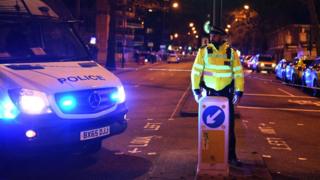[ad_1]

Image copyright
Getty Images
Only about one in 14 crimes reported to police lead to a suspect being charged, official statistics have shown.
Covering the year up to September 2019, the Home Office figures for England and Wales mark a new low, having fallen from about one in seven in 2015.
It comes as knife crime recorded by police rose by 7% to an all-time high and robberies increased by 12%.
But homicides – including murder and manslaughter – fell by 6% to 617 deaths, and fatal stabbings fell 20%.
The proportion of crimes leading to a prosecution in England and Wales has been in continuous decline since 2015, when the figures were first compiled this way.
Between September 2015 and September 2018, it had fallen from 14% to 8.4%, and it has now dropped again to 7.3% – about one in 14 cases.
In addition, 1.4% of crimes led to a caution, 2.3% led to an informal warning and 0.1% were “taken into consideration” – meaning an offender admitted them as part of another investigation.
Yvette Cooper, chair of the Commons Home Affairs Select Committee, said the fall in prosecutions was “extremely concerning”.
“The public need to have confidence that the criminal justice system is finding, prosecuting and convicting criminals – so it is a serious problem that fewer crimes are being solved or dealt with,” she said.
She said MPs had previously warned that police forces were “badly overstretched” and that without additional funding, there would be “serious consequences for public safety”.
Rape had the lowest rate of charges at just 1.4%, while for thefts it was 5.4% and for robberies it was 7.2%.
Cases where the victim does not support criminal proceedings have risen sharply over five years, from 8.7% to 22.9%.
In 43.4% of cases, no suspect could be identified.
It comes as separate crime figures show that police recorded 44,771 offences involving a knife or sharp instrument in the year to September 2019 – an increase of 7% to a new record high.
Helen Ross, from the Office for National Statistics’ Centre for Crime and Justice, said there is a “mixed picture” across the country for knife crime and “overall levels of violence remain steady”.
“We have also seen the number of homicides where a knife or sharp instrument was used decrease by a fifth, driven by falls in London,” she said.
The ONS said that although improvements in the way crime was recorded may have contributed to the 12% rise in robberies, to a total of 82,542 offences, some of the increase is “likely to reflect a real change”.
The crime figures exclude Greater Manchester, due to technical issues with recording the data.
The Crime Survey for England and Wales – which is considered better for judging long-term trends – suggests that overall crime rates are broadly stable.
But the survey shows that fraud rose by 9%, driven by a rise in bank and credit account fraud.
[ad_2]
Source link
